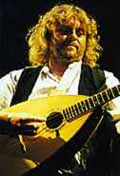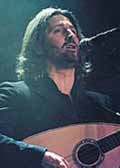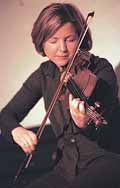 |
||
The Living Tradition
|
|
|||
| The
Ballad in Inishowen - by Dan Milner Issue 50 January/February 2003 |
|
|||
|
{graphic} |
||||
|
The land lying between the loughs of Foyle and Swilly spreads out from a narrow neck starting near the quays of Derry in the east, rising to the heights of Grianan Ailigh and descending to Inch Island in the west. It's a mountainous triangle edged with sweeping strands and plunging cliffs, and dotted with old fishing villages, farms and market towns. Banba's Crown at Malin Head on the northern coast is the farthest reach of the Irish mainland. Only the Outer Hebridies of Scotland lie between it and the top of the world. The Inishowen Peninsula was the last region of Ireland to fall to British domination (1608). Its living folk song tradition is in the English language and many of the oldest ballads come originally from Scotland. Scots people who came to settle during the Plantation of Ulster brought some songs but migrant workers and emigrants returning from Scotland introduced many more. Ballads from the broadside era known in most regions of Ireland and abroad are a large portion of the repertoire. Locally composed songs, serious and humourous, on topics ranging from shipwrecks to ancient cows are abundant. Music hall and American vaudeville songs are heard as well. The singing tradition of Inishowen remained very strong into the early 1950s. Weddings, the departure or return of emigrants and sporting events were some occasions for parties that often lasted till daybreak. The summer brought other 'big nights' when workers from Scottish cities flocked to Inishowen for their holidays. In most townlands, there was usually a house associated with music and song through the individual or family living there. Weekly or monthly parties throughout the year were held in these 'ceilidhing houses'. As income increased, many of these gatherings were relocated to public houses. After 1950, rural electrification brought radio and television to homes and jukeboxes to pubs enticing the younger generation away from native traditions and forcing many older singers to abandon their songs. The opportunities for them to perform their art no longer existed. In the mid-1970s, Jim McFarland of Derry and Jimmy McBride, long resident in Buncrana but originally from Gaoth Dobhair in the west Donegal gaeltacht, began collecting songs from a few Inishowen singers for their personal use. They soon realized that the Lough Swilly side of the peninsula contained a vast store of traditional balladry. When one of their informants, John McDaid, died unexpectedly, a sense of urgency hit, their mission broadened and the two became more systematic. The first tangible result was the publication in 1985 of My Parents Reared Me Tenderly, a collection of 58 ballads and songs mostly from the Buncrana and Clonmany areas. The selections came from the repertoires of singers such as Corney McDaid, Mary Ann Canny, Jimmy Grant, Paddy Hegarty, Jimmy Houghton, Dennis McDaid and Pat McDaid, all now deceased. When Jim McFarland left for Dublin in 1985, Jimmy McBride continued the work. His collection, The Flower of Dunaff Hill, contains the words and music to 71 items and includes background notes. At the book launch in 1988, a suggestion was made to form The Inishowen Traditional Singers' Circle to celebrate, encourage, and perpetuate the folk song and ballad tradition of the Inishowen Peninsula. Monthly singing sessions were set up and two cassettes of traditional song were subsequently issued. In 1990, the Circle organised a weekend seminar to extend the awareness of the tradition, making it available to a wider audience. Since then, seminars have been organised annually to strengthen the bonds of friendship that now exist between the Inishowen tradition and singers from all parts of Ireland and from overseas. The 2003 Inishowen International Folk Song & Ballad Seminar will be the fourteenth. Held between March 21st and 24th in the villages of Ballyliffin and Clonmany, it combines scholarly presentations, song recitals and numerous open singing sessions. Up to 300 attend each year and nearly all are singers. More than half are local residents with many visitors coming from Britain and North America. Invited guests in 2003 will include Treasa NiMhiollain (Aran Islands), Jackie Boyce (Co. Down), Jerry O'Reilly (Dublin), Gerald McCloskey (Co. Derry), Jane Cassidy (Belfast), Len Graham (Co. Antrim) and John Campbell (Co. Armagh) from Ireland; Stephen Black, Donal Maguire, Ian Russell, John Waltham and George Withers from England; Maureen Jelks and Kirsty Potts from Scotland; and Bonnie Milner from the United States. Veteran folk song collector Tom Munnelly of University College Dublin, ballad scholar John Moulden and Dr. Ian Russell, Director of Ethnology at the Elphinstone Institute, University of Aberdeen, will give illustrated talks. Another seminar feature will be the launch of Irish Songs from Old New England, a compact disc by modern-day Irish and North American singers featuring items from the Flanders Ballad Collection of Irish origin and Irish-American making. Past seminar topics have included War & Rebellion, Love, the Sea, Children's' Songs, Street Ballads, and Humour in Traditional Song. Last year's theme was Rural Folk Songs & Urban Ballads and was a tribute to one of Inishowen's great singing families, the James 'Eoghain' McGonigle clan. The 2003 topic, perhaps the most challenging yet, will be Religion & Morality in the Folk Song Tradition. While the official presentation is geared to the main theme, Inishowen's many singing sessions are open, seemingly endless and of a very high standard. Although the seminar has many attractions, the greatest of all is that it takes place with the enthusiastic participation of the local traditional singers and much of the Saturday afternoon session is devoted to songs sung by them. Because space is limited, potential visitors are advised to book early. Complete details are available at the Website. http://pages.prodigy.net/folkmusic/inishowenseminar.htm or from the Seminar Director, Jimmy McBride, 66 The Woods, Tullyarvan, Buncrana, Co. Donegal, Ireland (Tel. 00353 77 61210). Dan Milner |
||||
|
Links, further information and recordings: |



